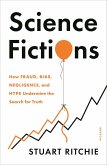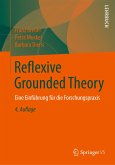Martin J. Packer
The Science of Qualitative Research
Martin J. Packer
The Science of Qualitative Research
- Gebundenes Buch
- Merkliste
- Auf die Merkliste
- Bewerten Bewerten
- Teilen
- Produkt teilen
- Produkterinnerung
- Produkterinnerung
This updated edition is an examination of qualitative research in the social sciences, exploring its roots to analyze its current state.
Andere Kunden interessierten sich auch für
![Science Fictions Science Fictions]() Stuart RitchieScience Fictions21,99 €
Stuart RitchieScience Fictions21,99 €![Quantitative Social Science Data with R Quantitative Social Science Data with R]() Brian J FogartyQuantitative Social Science Data with R35,99 €
Brian J FogartyQuantitative Social Science Data with R35,99 €![Sensitivity Analysis: Matrix Methods in Demography and Ecology Sensitivity Analysis: Matrix Methods in Demography and Ecology]() Hal CaswellSensitivity Analysis: Matrix Methods in Demography and Ecology38,99 €
Hal CaswellSensitivity Analysis: Matrix Methods in Demography and Ecology38,99 €![Mathematical Modeling of Social Relationships Mathematical Modeling of Social Relationships]() Mathematical Modeling of Social Relationships75,99 €
Mathematical Modeling of Social Relationships75,99 €![Analytical Family Demography Analytical Family Demography]() Analytical Family Demography112,99 €
Analytical Family Demography112,99 €![Reflexive Grounded Theory Reflexive Grounded Theory]() Franz BreuerReflexive Grounded Theory39,99 €
Franz BreuerReflexive Grounded Theory39,99 €![Rekonstruktive Sozialforschung Rekonstruktive Sozialforschung]() Ralf BohnsackRekonstruktive Sozialforschung26,90 €
Ralf BohnsackRekonstruktive Sozialforschung26,90 €-
-
-
This updated edition is an examination of qualitative research in the social sciences, exploring its roots to analyze its current state.
Produktdetails
- Produktdetails
- Verlag: Cambridge University Press
- Seitenzahl: 550
- Erscheinungstermin: 4. Januar 2018
- Englisch
- Abmessung: 235mm x 157mm x 34mm
- Gewicht: 938g
- ISBN-13: 9781108417129
- ISBN-10: 1108417124
- Artikelnr.: 48862499
- Herstellerkennzeichnung
- Libri GmbH
- Europaallee 1
- 36244 Bad Hersfeld
- gpsr@libri.de
- Verlag: Cambridge University Press
- Seitenzahl: 550
- Erscheinungstermin: 4. Januar 2018
- Englisch
- Abmessung: 235mm x 157mm x 34mm
- Gewicht: 938g
- ISBN-13: 9781108417129
- ISBN-10: 1108417124
- Artikelnr.: 48862499
- Herstellerkennzeichnung
- Libri GmbH
- Europaallee 1
- 36244 Bad Hersfeld
- gpsr@libri.de
Martin Packer is Professor of Psychology at the University of San Buenaventura, in Colombia. He has taught at the Universidad de los Andes, Columbia, the University of California, Berkeley, the University of Michigan, and Duquesne University, Pennsylvania. His research has explored many aspects of children's development, in social and cultural context. Packer is co-editor of Entering the Circle: Hermeneutic Investigation in Psychology (1989, with Ritch Addison) and Cultural and Critical Perspectives on Human Development (2001, with Mark Tappan) and author of The Structure of Moral Action, of Changing Classes: School Reform and the New Economy (1985), and of Child Development: Understanding a Cultural Perspective (2017). He was one of the founding co-editors of the journal Qualitative Research in Psychology and has published articles in American Psychologist, Educational Psychologist, and Mind, Culture and Activity.
Part I. The Objective Study of Subjectivity: 1. What is science?
2. The qualitative research interview
3. The analysis of qualitative interviews
4. Hermeneutics and the project for a human science
5. Qualitative analysis reconsidered
Part II. Ethnographic Fieldwork - the Focus on Constitution: 6. Calls for interpretive social science
7. Dualism and constitution: the social construction of reality
8. Constitution as ontological
9. The crisis in ethnography
10. Studying ontological work
Part III. Inquiry with an Emancipatory Interest: 11. Qualitative research as critical inquiry
12. Emancipatory inquiry as rational reconstruction
13. Social science as participant objectification
14. Archaeology, genealogy, ethics
15. A historical ontology of ourselves
16. The concrete investigation of constitution.
2. The qualitative research interview
3. The analysis of qualitative interviews
4. Hermeneutics and the project for a human science
5. Qualitative analysis reconsidered
Part II. Ethnographic Fieldwork - the Focus on Constitution: 6. Calls for interpretive social science
7. Dualism and constitution: the social construction of reality
8. Constitution as ontological
9. The crisis in ethnography
10. Studying ontological work
Part III. Inquiry with an Emancipatory Interest: 11. Qualitative research as critical inquiry
12. Emancipatory inquiry as rational reconstruction
13. Social science as participant objectification
14. Archaeology, genealogy, ethics
15. A historical ontology of ourselves
16. The concrete investigation of constitution.
Part I. The Objective Study of Subjectivity: 1. What is science?; 2. The qualitative research interview; 3. The analysis of qualitative interviews; 4. Hermeneutics and the project for a human science; 5. Qualitative analysis reconsidered; Part II. Ethnographic Fieldwork - the Focus on Constitution: 6. Calls for interpretive social science; 7. Dualism and constitution: the social construction of reality; 8. Constitution as ontological; 9. The crisis in ethnography; 10. Studying ontological work; Part III. Inquiry with an Emancipatory Interest: 11. Qualitative research as critical inquiry; 12. Emancipatory inquiry as rational reconstruction; 13. Social science as participant objectification; 14. Archaeology, genealogy, ethics; 15. A historical ontology of ourselves; 16. The concrete investigation of constitution.
Part I. The Objective Study of Subjectivity: 1. What is science?
2. The qualitative research interview
3. The analysis of qualitative interviews
4. Hermeneutics and the project for a human science
5. Qualitative analysis reconsidered
Part II. Ethnographic Fieldwork - the Focus on Constitution: 6. Calls for interpretive social science
7. Dualism and constitution: the social construction of reality
8. Constitution as ontological
9. The crisis in ethnography
10. Studying ontological work
Part III. Inquiry with an Emancipatory Interest: 11. Qualitative research as critical inquiry
12. Emancipatory inquiry as rational reconstruction
13. Social science as participant objectification
14. Archaeology, genealogy, ethics
15. A historical ontology of ourselves
16. The concrete investigation of constitution.
2. The qualitative research interview
3. The analysis of qualitative interviews
4. Hermeneutics and the project for a human science
5. Qualitative analysis reconsidered
Part II. Ethnographic Fieldwork - the Focus on Constitution: 6. Calls for interpretive social science
7. Dualism and constitution: the social construction of reality
8. Constitution as ontological
9. The crisis in ethnography
10. Studying ontological work
Part III. Inquiry with an Emancipatory Interest: 11. Qualitative research as critical inquiry
12. Emancipatory inquiry as rational reconstruction
13. Social science as participant objectification
14. Archaeology, genealogy, ethics
15. A historical ontology of ourselves
16. The concrete investigation of constitution.
Part I. The Objective Study of Subjectivity: 1. What is science?; 2. The qualitative research interview; 3. The analysis of qualitative interviews; 4. Hermeneutics and the project for a human science; 5. Qualitative analysis reconsidered; Part II. Ethnographic Fieldwork - the Focus on Constitution: 6. Calls for interpretive social science; 7. Dualism and constitution: the social construction of reality; 8. Constitution as ontological; 9. The crisis in ethnography; 10. Studying ontological work; Part III. Inquiry with an Emancipatory Interest: 11. Qualitative research as critical inquiry; 12. Emancipatory inquiry as rational reconstruction; 13. Social science as participant objectification; 14. Archaeology, genealogy, ethics; 15. A historical ontology of ourselves; 16. The concrete investigation of constitution.








